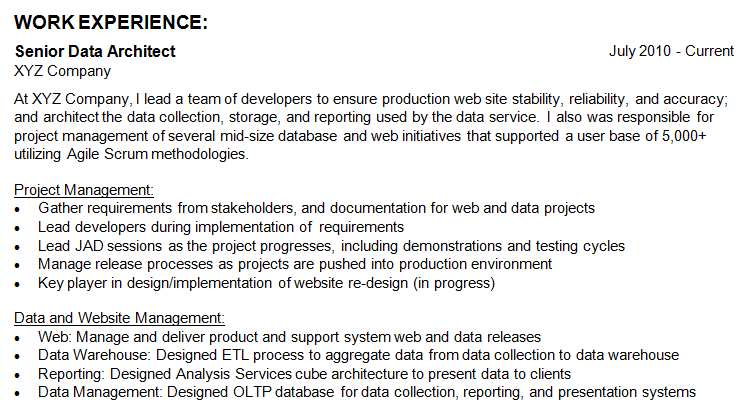By: Cate Murray | Comments | Related: More > Professional Development Resume
Problem
We hosted a presentation on “Resume Writing for SQL Server Professionals” on July 22. We received several great questions we wanted to take an opportunity to answer in the form of a tip. Below are the questions that were submitted, and our responses. If you missed the webcast, you can view it in the archives!
Solution
We’ve categorized the questions we received during our Resumes webcast, and provided our responses below.
Resume Formatting Questions
What is the best file format for resume - Word / PDF?
- We would recommend using Microsoft Word format in the majority of cases. If you have a creative background and are interviewing for a creative role, PDF might be a more appropriate choice. Regardless of what you choose, the importance lies in the overall aesthetics, formatting, structure, organization of the content, and the content itself. You want to make sure key information that would differentiate yourself from other candidates, such as Project Highlights, Technical Competencies, Awards, Accomplishments and Certifications are instantly visible.
Is there a separate resume format for contract jobs?
- There is not a separate resume format for contract jobs, but you do want to make sure to clarify in your resume the positions that were contracts. Two examples of how you can communicate this via your resume are as follows:


Resume Employment Questions
For older experience, say 12 years ago, is it advisable to summarize it in one paragraph instead of bullets?
- Bullets are always preferable to paragraphs. If you have positions that were 10+ years ago and are not relevant to what you do today or your target career path, simply include company, title and dates of employment. From our experience, hiring managers typically only look at the current position and last 1-2 roles (or 3-5 years). Here is an example:

Organization of Experience Questions
Do you have any recommendations for someone with years of experience, but very broad experience including many other responsibilities? I feel like I’m misrepresenting myself as a DBA with 20 years of experience, because I did so many other things working for small companies.
- It’s important to communicate all your responsibilities in a structured manner, especially if you’ve been in a hybrid role. You can categorize your responsibilities by the main role/function. For example, if you’re a Lead DBA with Project Management responsibilities, it’s important to highlight your duties within each role. Here is an example:

How do you manage multiple versions of your resume?
- It’s a good idea to have a few different versions of your resume depending on what jobs you are targeting. An easy way to keep track of different versions is by naming your resumes different names such as “John Smith – PM version” or “John Smith – Lead Dev version”.
- As you’re applying to jobs, make sure you’re looking at the requirements for each position. Include the version of your resume that highlights any relevant experience you have that is applicable to that particular role. It would also be well worth your time to add any additional experience to your resume related to the requirements. It’s a best practice to essentially customize your resume for the job you’re applying to, especially if you feel confident your resume will be reviewed by a hiring Manager.
Questions related to potential Resume Concerns
What should you do with gaps in your resume? Stuff like family leave?
- Sometimes life gets in the way and it requires you to take an absence from the work force. Hiring managers typically understand this, but it’s important to address any large gaps on your resume. If you have done anything related to your field, such as personal pet projects, training, skills-based volunteering, etc. you can also note that. It’s good to show that you’ve made an effort to keep your skills up to date, even if you haven’t had a full-time job. Here is an example of wording to include on your resume:

When should you not include an assignment on your resume?
- If it’s a short period of time and you don’t feel as though you can provide a reference from that job, it may be a good idea to leave it off. This is a personal preference though and opinions will vary on this topic. Regardless, it’s important to remember that you need to be able to explain any gaps on your resume.
To be consistent with tense - past or present; how do you include responsibilities for the current job you are in? If you pick past, how do you handle your current work description?
- An option that we’ve seen (and this is only applicable to your current job) is to keep your everyday responsibilities in present tense and your accomplishments / past responsibilities in past tense. When in doubt, stick to the past tense, even with your current job. At the end of the day, consistency is the most important thing. Random mixing and matching of verb tenses is a resume no-no. Also, remember to use active verbs and phrases to bring resumes to life. Here are some examples: Built, Implemented, Improved, Developed, Designed, Lead, Configured, Created, Customized, and Deployed.
What are some big resume faux pas?
- Spelling, grammatical & formatting errors
- Overwhelming the reader with information
- Job hopping / numerous short contracts
- Large gaps in employment
- Laundry list of technical skills
- Unclear of work history
- Unclear on individual contributions / responsibilities
Next Steps
- Do you have more questions related to Resumes? Then post as a ‘Comment,’ and we’ll be happy to write a future Tip to address them!
- If you’re looking for more advice in the area of Resumes, one of our favorite resources is Live Career. They also have a Resume Builder and different Templates you can utilize if you need to start a resume from scratch.
About the author
|
Erica Woods has nearly a decade in the IT staffing world, an MBA,
and is a member of the Professional Association of Resume Writers
and Career Coaches.
|
About the author
 Cate Murray is responsible for managing the nationally-based talent acquisition strategies of the Apex Systems PMO and Business Analysis Practice and holds her PMP certification from PMI.
Cate Murray is responsible for managing the nationally-based talent acquisition strategies of the Apex Systems PMO and Business Analysis Practice and holds her PMP certification from PMI.This author pledges the content of this article is based on professional experience and not AI generated.
View all my tips







